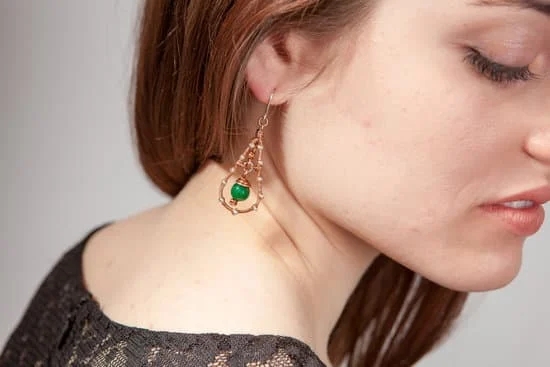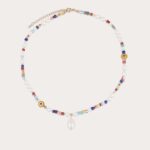Art Deco jewelry is a captivating and iconic style that emerged during the 1920s and 1930s, known for its bold geometric designs and exquisite craftsmanship. In this article, we will delve into the world of Art Deco jewelry, exploring its historical origins, distinct characteristics, and enduring popularity.
The Art Deco movement originated in Paris as a response to post-war optimism and a desire for modernization. It was influenced by various artistic styles, including Cubism, Futurism, and Egyptian art. As a result, Art Deco jewelry showcases a unique fusion of diverse cultural influences.
What sets Art Deco jewelry apart is its emphasis on clean lines, symmetry, and vibrant colors. Geometric shapes such as triangles, circles, and rectangles are often used in the design, giving the pieces a sleek and streamlined appearance. Additionally, Art Deco jewelry frequently incorporates lavish materials like diamonds, platinum, jade, and colored gemstones to create eye-catching statements of luxury.
Despite originating nearly a century ago, Art Deco jewelry continues to captivate collectors and fashion enthusiasts alike. Its timeless appeal lies in its ability to seamlessly blend classic elegance with modern sensibilities.
In this article, you will learn how to identify authentic pieces of Art Deco jewelry as well as explore different types of stunning creations from renowned designers of the era. So dive into the world of Art Deco jewelry and discover the beauty and significance behind these remarkable pieces of wearable art.
Characteristics of Art Deco Jewelry
Art Deco jewelry is characterized by its distinct design elements that set it apart from other styles. These characteristics reflect the cultural and artistic movement of the 1920s and 1930s, known as Art Deco. This style embraces geometric shapes, symmetry, bold colors, and a mixture of influences from different cultures. Understanding these characteristics can help you identify and appreciate authentic Art Deco jewelry.
Geometric Shapes, Symmetry, and Bold Colors
One of the most noticeable features of Art Deco jewelry is the use of geometric shapes, such as squares, triangles, rectangles, and circles. These shapes are often arranged in symmetrical patterns to create a visually balanced design. The crisp lines and angles emphasize the modern aesthetic associated with the Art Deco movement.
Bold colors were also prevalent in Art Deco jewelry. The use of contrasting colors or striking combinations like black and white or vibrant gemstones against precious metals added drama to the pieces. Popular gemstones used during this period included diamonds, emeralds, rubies, sapphires, and onyx.
Egyptian, African, and Oriental Motifs
Many designers drew inspiration from ancient civilizations while creating their Art Deco pieces. Egyptian motifs like hieroglyphics, scarabs (beetle-shaped amulets), lotus flowers, as well as images of African animals like elephants or leopards were commonly incorporated into designs.
Oriental influences were also prominent in Art Deco jewelry. Chinese jade carvings or Japanese lacquer work inspired designers to incorporate similar elements into their pieces. These cultural influences added a sense of exoticism to the designs while still maintaining a sleek and modern aesthetic.
Use of Materials
Art Deco jewelry was crafted using lavish materials to capture the essence of luxury that defined this period. Platinum, known for its durability and purity, was the favored metal for creating Art Deco pieces. The white color of platinum enhanced the brilliance of diamonds and colored gemstones.
Diamonds, with their timeless appeal and unmatched sparkle, were extensively used in Art Deco jewelry. Colored gemstones like emeralds, rubies, sapphires were also popular choices due to their vibrant hues. These gemstones were often cut into geometric shapes or set in settings that allowed maximum light reflection.
Identifying Authentic Art Deco Jewelry
Introduction:
Art Deco jewelry, with its bold and geometric designs, holds a significant place in the world of fashion and design. Originating in the 1920s and 1930s, this style of jewelry reflects the cultural and artistic movements of the time. By understanding the characteristics and key indicators, one can successfully identify authentic Art Deco pieces.
Characteristics of Art Deco Jewelry:
Art Deco jewelry is known for its distinct design elements, such as geometric shapes, symmetry, and bold colors. The influence of Egyptian, African, and Oriental motifs can be seen in many pieces from this era. Additionally, Art Deco jewelry often features high-quality materials like diamonds, platinum, and colored gemstones. These materials were chosen to enhance the overall aesthetic value of these pieces.
Identifying Authentic Art Deco Jewelry:
Provenance and historical documentation play a crucial role in authenticating Art Deco jewelry. It is important to seek out pieces that come with verified records or documents that trace their origins back to the Art Deco era. Craftsmanship and quality are also integral factors to consider when determining authenticity.
Fine attention to detail and precision in workmanship are key indicators of genuine Art Deco pieces. Furthermore, examining for makers’ marks, hallmarks, patent numbers or other identifying markings can provide additional evidence of authenticity.
| Important Factors | Suggestions/Indicators |
|---|---|
| Provenance & Historical Documentation | Look for documented records tracing back to the Art Deco era. |
| Craftsmanship & Quality | Examine for fine attention to detail and precision in workmanship. |
| Makers’ Marks, Hallmarks, Patent Numbers | Check for these identifying markings on the jewelry. |
Popular Types of Art Deco Jewelry
Art Deco jewelry encompasses a wide variety of styles and designs, each unique in its own way. From rings to necklaces, bracelets to brooches, Art Deco jewelry offers a diverse range of pieces that exemplify the elegance and glamour of the era. This section will explore some of the most popular types of Art Deco jewelry and highlight their distinct characteristics.
Rings
Art Deco rings are known for their bold and geometric designs. They often feature intricate metalwork and intricate settings that showcase the beauty of gemstones. Popular ring styles during this period include cocktail rings, which typically feature large, colorful center stones such as rubies or emeralds surrounded by smaller diamonds. Other common motifs include filigree patterns, stepped designs, and geometric arrangements.
Necklaces
Art Deco necklaces are characterized by their long and elegant chains, often adorned with decorative pendants or geometric patterns. These necklaces often incorporate vibrant colored gemstones like sapphires, emeralds, or amethysts. The pendant designs can vary from architectural forms to floral motifs or even stylized figures such as Egyptian-inspired pharaohs or hieroglyphics.
Bracelets
Bracelets were a staple accessory during the Art Deco period and showcased intricate craftsmanship. Many Art Deco bracelets featured structured lines and geometric shapes, often embellished with diamonds or colored gemstones. Some popular bracelet styles include bangles with engraved patterns or diamond-studded clasps, flexible link bracelets with symmetrical patterns, and cuff bracelets featuring bold designs.
Brooches
Art Deco brooches were highly coveted for their ability to add a touch of elegance to any outfit. These accessories often featured bold shapes such as flowers, bows, or animals rendered in diamonds or colored gemstones. Art Deco brooches were versatile and could be worn on a lapel, collar, hat, or even used as a scarf pin.
These different types of Art Deco jewelry highlight the versatility and creativity of the era. Whether you prefer the boldness of an Art Deco ring, the elegance of a necklace, the intricacy of a bracelet, or the versatility of a brooch, each piece showcases the iconic style and timeless appeal of this remarkable period in jewelry design.
Famous Art Deco Jewelry Designers and their Masterpieces
The Art Deco era was marked by an explosion of creativity and innovation in the field of jewelry design. During this period, several renowned designers left their mark on the industry with their exceptional creations. These designers not only captured the essence of the Art Deco movement but also set new standards for craftsmanship and style. Let’s take a closer look at some famous Art Deco jewelry designers and their masterpieces.
- Cartier: Recognized as one of the leading jewelry houses, Cartier played a significant role in popularizing Art Deco jewelry. Their designs epitomized elegance, luxury, and modernity. One of their most iconic pieces is the “Tutti Frutti” necklace, which featured colorful gemstones such as rubies, sapphires, and emeralds set in a striking geometric pattern.
- Boucheron: Founded by Frédéric Boucheron in 1858, this French brand created exquisite Art Deco pieces that exuded sophistication and originality. One notable masterpiece from Boucheron is the “Question Mark” necklace, which showcased an intricate design of diamonds and black onyx in a symmetrical pattern.
- Van Cleef & Arpels: Known for their exceptional craftsmanship and innovative designs, Van Cleef & Arpels became synonymous with luxury during the Art Deco era. One standout creation is the “Zip” necklace, inspired by the functional zipper. This piece was crafted with precision to transform from a bracelet to a necklace seamlessly.
These legendary designers pushed boundaries with their imaginative designs, incorporating unique materials like coral, jadeite, and lacquer into their pieces. They drew inspiration from diverse cultures such as ancient Egypt and India to create distinctive motifs that reflected the spirit of the times.
Art Deco jewelry from these visionary designers continues to be highly sought after by collectors and enthusiasts alike. Their masterpieces are not just beautiful adornments but also valuable works of art that continue to inspire and captivate audiences worldwide.
| Designer | Masterpiece |
|---|---|
| Cartier | Tutti Frutti necklace |
| Boucheron | Question Mark necklace |
| Van Cleef & Arpels | Zip necklace |
Caring and Maintaining Art Deco Jewelry
Art Deco jewelry is not only precious in terms of its historical and cultural significance, but also in its monetary value. To preserve the beauty and longevity of Art Deco pieces, proper care and maintenance are vital. This section will provide valuable tips on caring for and maintaining Art Deco jewelry.
Proper Cleaning
- Gently clean Art Deco jewelry using a soft-bristled toothbrush dipped in mild soapy water. Avoid harsh chemicals or abrasive cleaners that can damage the delicate surfaces.
- Rinse the jewelry thoroughly under lukewarm water to remove any soap residue.
- Dry the pieces with a soft cloth or air dry them before storing.
Storage Recommendations
- Store Art Deco jewelry separately in fabric-lined compartments or individual pouches to prevent scratching or tangling.
- Avoid exposing the pieces to direct sunlight or extreme temperature fluctuations, as this can cause damage and discoloration.
- Avoid storing jewelry in humid environments to prevent tarnishing. Use silica gel packets to absorb excess moisture if necessary.
- Consider using an anti-tarnish strip or a tarnish-resistant cloth when storing your Art Deco jewelry to maintain their luster.
Preventing Damage
- Avoid wearing Art Deco jewelry during activities that may subject them to excessive force or impact, such as sports or heavy lifting.
- Remove your jewelry before swimming, bathing, or applying cosmetics, lotions, or perfumes to avoid exposure to chemicals that may harm the pieces.
- To prevent damage from accidental drops, consider having clasps and other vulnerable parts checked regularly by a professional jeweler for tightness and secure fittings.
Professional Care Options
- Periodically have your Art Deco jewelry inspected and professionally cleaned by a reputable jeweler to ensure the longevity of the pieces.
- If your jewelry requires repair, seek services from experienced jewelers who specialize in Art Deco jewelry restoration to maintain its authenticity and value.
- Consider getting an appraisal for your Art Deco pieces every few years to stay updated on their current value and insurance purposes.
By following these care and maintenance guidelines, you can protect and preserve the integrity of your valuable Art Deco jewelry for generations to come.
Investment Value of Art Deco Jewelry
Art Deco jewelry has not only captured the hearts of collectors and enthusiasts, but it has also caught the attention of investors seeking to capitalize on its investment value. The increasing demand for Art Deco jewelry in recent years is driven by its rarity, quality craftsmanship, and historical significance. As a result, investing in Art Deco jewelry has become a lucrative opportunity for those with an eye for timeless beauty and potential financial gain.
When assessing the investment value of Art Deco jewelry, several factors come into play. Rarity plays a crucial role in determining the desirability and value of a piece. As Art Deco jewelry was produced during a specific period from the 1920s to 1930s, finding well-preserved and authentic pieces can be challenging. The scarcity of these pieces adds to their allure and contributes to their value.
Quality is another crucial aspect that affects the investment potential of Art Deco jewelry. Craftsmanship during this era was characterized by exquisite attention to detail and meticulous handiwork. From intricate metalwork to precisely set gemstones, each piece was crafted with exceptional skill. Jewelry with superior craftsmanship will command higher prices and retain its value over time.
The historical significance of Art Deco jewelry is yet another factor that attracts investors. Art Deco represents a cultural revolution during a transformative time in history. The movement itself symbolizes innovation, modernity, and rebellion against traditional aesthetic norms. Owning a piece of history adds an extra layer of meaning to the investment, making it all the more valuable.
For those interested in investing in Art Deco jewelry, it is crucial to thoroughly research and educate oneself about different styles, makers, and market trends. Consulting with experts or experienced dealers can provide valuable insights into identifying authentic pieces and understanding pricing trends.
Investing in Art Deco jewelry requires careful consideration as with any investment. While its rarity, quality craftsmanship, and historical significance contribute to its appeal as an investment, it is essential to always buy from reputable sources and acquire provenance documentation whenever possible. Art Deco jewelry not only allows investors to appreciate its beauty but also offers the potential for a lasting and valuable investment.
Where to Buy Authentic Art Deco Jewelry
In conclusion, for those interested in purchasing authentic Art Deco jewelry, it is important to know where to find reputable sources. There are several options available, including antique dealers, auction houses, and online platforms specializing in vintage and antique jewelry. When considering where to buy Art Deco jewelry, there are a few factors to keep in mind.
Firstly, it is essential to choose a trusted dealer or seller with a good reputation. Look for established antique dealers who specialize in Art Deco pieces and have a solid track record of sourcing and selling authentic jewelry. Online platforms can also be reliable sources if they have positive customer reviews and offer certifications of authenticity.
Secondly, consider the certifications and warranties offered by the seller. Reputable dealers will often provide certificates of authenticity to verify the age and materials used in the piece. Additionally, look for sellers who offer warranties or return policies so that you can be assured of your purchase’s quality.
Lastly, make sure to educate yourself on how to identify authentic Art Deco jewelry before making a purchase. Familiarize yourself with the characteristics outlined earlier in this article-geometric shapes, bold colors, specific materials used-and learn about maker’s marks, hallmarks, and patent numbers associated with Art Deco pieces. This knowledge will help you assess the value and authenticity of any potential purchases.
By following these guidelines and doing thorough research before buying Art Deco jewelry, you can ensure that you are investing in genuine pieces that hold historical significance and timeless appeal. Whether you are a collector or simply an admirer of this iconic style, purchasing authentic Art Deco jewelry can be a rewarding experience that allows you to own a piece of history.
Frequently Asked Questions
What are 3 characteristics of the Art Deco time period and jewelry?
Three characteristics of the Art Deco time period and jewelry are geometric shapes, bold colors, and contrasting materials. The Art Deco era, which originated in the 1920s and lasted through the 1930s, was known for its fascination with streamlined and symmetrical shapes. Jewelry during this time often featured angular designs with sharp edges, incorporating geometric forms like triangles, rectangles, and circles.
Additionally, Art Deco jewelry frequently showcased vibrant colors such as red, blue, black, and green through the use of gemstones or enameling techniques. Lastly, this period embraced the combination of different materials to create striking contrasts. For example, platinum would often be paired with diamonds or colorful gemstones to achieve a visually appealing balance.
What are examples of Art Deco jewelry?
Examples of Art Deco jewelry can include diamond-studded brooches, long pendant necklaces adorned with intricate motifs, and cocktail rings featuring large gemstones in geometric settings. The allure of Art Deco lies in its ability to blend elegance with a modern aesthetic.
Many pieces from this era display strong lines and symmetrical arrangements that create a sense of harmony while making a bold fashion statement. Art Deco jewelry also often incorporates elements inspired by nature such as intricately designed feathers or stylized floral patterns.
What are the design elements of Art Deco jewelry?
The design elements of Art Deco jewelry encompass a range of distinctive characteristics that set it apart from other styles. One key element is symmetry; many pieces feature symmetrical patterns achieved through precisely balanced arrangements of gemstones or metalwork. Angularity is another prominent design element seen in Art Deco jewelry – whether it’s sharp corners on rectangular pendants or triangular motifs on earrings – the use of angles adds a sense of structure and visual interest to the piece.
Streamlining is yet another important aspect; streamlined curves give a sense of movement to bracelets or necklace links but still maintain a clean overall shape. Finally, repetition serves as an essential design element in this style. Geometric shapes or motifs are often repeated throughout a piece, creating a harmonious and visually pleasing composition.

Welcome to my jewelry blog! My name is Sarah and I am the owner of this blog.
I love making jewelry and sharing my creations with others.
So whether you’re someone who loves wearing jewelry yourself or simply enjoys learning about it, be sure to check out my blog for insightful posts on everything related to this exciting topic!





